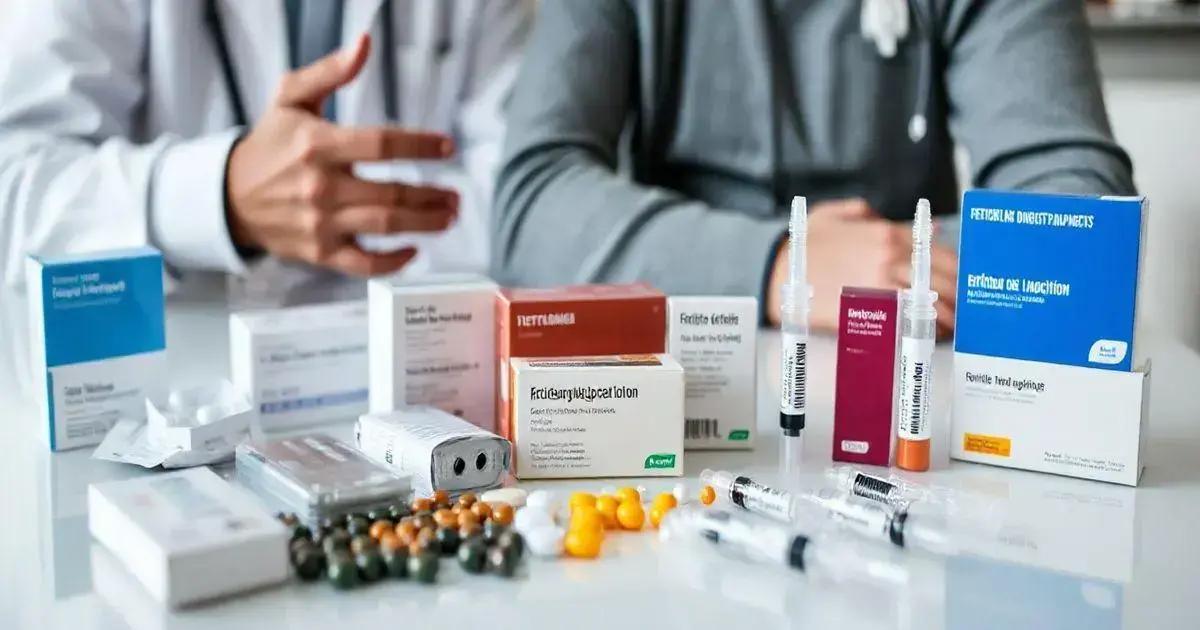Erectile dysfunction medications, such as phosphodiesterase type 5 inhibitors (like Sildenafil and Tadalafil), work by increasing blood flow to the penis, enabling erections during sexual arousal. These treatments can have side effects, so it’s essential to consult a healthcare provider to explore the best options based on individual health needs.
Erectile dysfunction (ED) medication plays a crucial role in helping individuals regain control over their sexual health. But how does erectile dysfunction medication work? In this article, we will explore the various types of medications available, how they function to facilitate arousal and erection, and what you need to know about potential side effects. Understanding the science behind these treatments is essential for making informed decisions about your health.
Understanding Erectile Dysfunction

Erectile dysfunction (ED) affects millions of men worldwide. Understanding erectile dysfunction is crucial to finding effective treatment options. ED is when a man has trouble getting or keeping an erection firm enough for sexual intercourse. This condition can result from both physical and psychological factors.
Physical Causes of ED
Many physical health issues can lead to erectile dysfunction. Common conditions include heart disease, diabetes, obesity, and high blood pressure. Additionally, certain medications can also contribute to this issue. It’s important to recognize that these health problems may affect blood flow, hormones, or the nervous system, all of which play a significant role in achieving an erection.
Psychological Factors
In addition to physical health, psychological issues can also impact sexual performance. Stress, anxiety, and depression are common culprits. The pressure to perform can create a cycle of anxiety that makes the problem worse. Understanding these psychological aspects is critical because they can often be addressed through counseling or therapy.
Age and Lifestyle Choices
Aging is another factor that affects erectile function. As men grow older, they are more likely to experience erectile dysfunction. Additionally, lifestyle choices such as smoking, excessive alcohol use, and lack of exercise can contribute significantly to this condition. Making healthier choices can improve not only overall health but also sexual health.
The Importance of Communication
Open communication with partners about concerns regarding sexual health can help reduce anxiety and promote intimacy. Discussing erectile dysfunction can help normalize the condition and open the door to finding solutions together.
Recognizing the complexities of erectile dysfunction allows for a better understanding of how medication and other treatments can help. By exploring both physical and psychological aspects, individuals can seek appropriate care and support.
Types of Medications Available

When it comes to treating erectile dysfunction, there are several types of medications available. Each works differently to address the symptoms of ED. Understanding these options can help individuals and their healthcare providers choose the right treatment.
Phosphodiesterase Type 5 Inhibitors (PDE5i)
The most common medications for erectile dysfunction are phosphodiesterase type 5 inhibitors. These include popular options like Sildenafil (Viagra), Tadalafil (Cialis), Vardenafil (Levitra), and Avanafil (Stendra). They enhance blood flow to the penis by blocking a specific enzyme, allowing for erections when sexually stimulated.
Hormone Therapy
In some cases, low testosterone levels may contribute to erectile dysfunction. Hormone therapy can help with this issue. Doctors may prescribe testosterone injections or gel supplements to boost hormone levels and improve sexual function.
Alprostadil
Another option is Alprostadil, which can be administered as an injection or a suppository. This medication works by directly relaxing the blood vessels in the penis, leading to an erection. It is often recommended for men who do not respond well to PDE5 inhibitors.
Vacuum Erection Devices
While not a medication in the traditional sense, vacuum erection devices can assist men with ED. These devices create a vacuum around the penis, encouraging blood flow and leading to an erection. Once achieved, a constriction ring can be placed at the base of the penis to maintain the erection.
Consulting with a Healthcare Provider
It’s essential to consult with a healthcare provider before starting any medication for erectile dysfunction. This ensures the treatment is safe and appropriate for individual health conditions and needs. Your doctor can guide you through your options and help find the most effective solution.
How These Medications Function

Understanding how these medications function is essential for grasping their role in treating erectile dysfunction. Most ED medications work by improving blood flow to the penis, enabling an erection when sexually stimulated.
Phosphodiesterase Type 5 Inhibitors (PDE5i)
PDE5 inhibitors like Sildenafil and Tadalafil enhance the effects of nitric oxide, a natural chemical in the body. When you are sexually aroused, nitric oxide is released, which helps relax the blood vessels in the penis. By inhibiting the action of the PDE5 enzyme, these medications allow for increased blood flow, resulting in an erection.
Alprostadil Mechanism
Alprostadil works differently than PDE5 inhibitors. When injected directly into the penis or used as a suppository, it stimulates smooth muscle relaxation and increases blood flow. This direct action leads to an erection without needing sexual arousal, making it a viable option for those who may not respond to oral medications.
Hormone Therapy
Hormone therapy addresses erectile dysfunction caused by low testosterone levels. The replacement therapy increases testosterone in the body, which can enhance libido and improve erectile function. This approach works directly on sexual desire and physiological response.
Vacuum Erection Devices
Vacuum erection devices create a vacuum that pulls blood into the penis, resulting in an erection. Once the erection is achieved, a constriction ring is placed at the base to maintain it. This method is non-invasive and can be effective for many men.
Importance of Sexual Arousal
It’s important to note that many of these medications require some form of sexual arousal to work effectively. They do not create an automatic erection; rather, they enhance the body’s natural response to sexual stimulation.
Potential Side Effects

While medications for erectile dysfunction are effective, they can also have potential side effects. It’s important to be aware of these effects to make informed decisions about treatment.
Common Side Effects
Some of the most common side effects include headaches, flushing of the skin, and indigestion. These are often mild and may go away after a few hours. Other users might experience nasal congestion or a stuffy nose.
More Serious Side Effects
In some cases, more serious side effects can occur. These include chest pain, vision changes, or hearing loss. If any of these symptoms occur, it’s vital to seek medical attention immediately. These side effects are rare but can be serious.
Interactions with Other Medications
ED medications might interact with certain other medications, especially nitrates, which are commonly prescribed for chest pain. Mixing these can lead to a dangerous drop in blood pressure. Always inform your doctor of all medications you are currently taking.
Considerations for Pre-existing Conditions
Men with specific pre-existing conditions, such as heart disease or severe liver problems, should use these medications cautiously. Consulting a healthcare provider is essential to ensure safety when taking ED medication.
Importance of Monitoring
Regular follow-ups with a doctor can help monitor side effects and adjust the treatment plan as necessary. Keeping open communication ensures the best results from erectile dysfunction treatments without unnecessary complications.
Consulting Your Doctor about Treatment Options

Consulting your doctor about treatment options for erectile dysfunction is a vital step in managing this condition. Healthcare professionals can provide personalized advice tailored to your specific needs.
Open Communication
It’s important to have an open dialogue with your doctor. Share your symptoms, medical history, and any medications you are currently taking. This information helps the doctor recommend suitable treatment options.
Discussing Medical History
During your consultation, discuss any pre-existing health conditions, such as heart disease, diabetes, or hormonal imbalances. These conditions can affect what treatments are available to you and might impact their effectiveness.
Exploring Treatment Options
Your doctor will outline various treatment options, including oral medications like Sildenafil or Tadalafil, hormone therapy, or other alternative treatments. They can explain how each option works and its potential benefits.
Evaluating Risks and Benefits
Every treatment option comes with its own set of risks and benefits. Your doctor will discuss these with you, helping to determine which method aligns best with your lifestyle and preferences. Understanding these factors is crucial for informed decision-making.
Follow-Up Appointments
Once you start a treatment plan, follow-up appointments will be necessary. These allow your doctor to monitor your progress, adjust dosages, or switch medications if needed. Regular check-ins ensure that the chosen treatment is effective and safe.
In Summary: Understanding Erectile Dysfunction Treatment
Erectile dysfunction is a common issue that many men face, and understanding how various treatments work is crucial. Medications like phosphodiesterase type 5 inhibitors, Alprostadil, and hormone therapy can provide effective solutions.
While these treatments can improve sexual health, being aware of potential side effects is equally important. Consulting a healthcare provider ensures that the chosen treatment aligns with individual health conditions and lifestyle.
By maintaining open communication with your doctor and exploring the available options, you can confidently navigate the path to effective ED treatment. Remember, consistent follow-ups are vital for ensuring ongoing success in managing this condition.
Don’t hesitate to reach out for help—addressing erectile dysfunction can lead to greater confidence and improved quality of life.
FAQ – Frequently Asked Questions about Erectile Dysfunction Treatment
What is erectile dysfunction?
Erectile dysfunction is the inability to get or maintain an erection sufficient for sexual intercourse, affecting many men at different ages.
What types of medications are available for ED?
There are several medications available, including phosphodiesterase type 5 inhibitors like Sildenafil and Tadalafil, hormone therapy, and Alprostadil.
How do ED medications work?
Most ED medications work by increasing blood flow to the penis, which helps achieve and maintain an erection when sexually aroused.
What are common side effects of ED medications?
Common side effects include headaches, flushing, indigestion, and nasal congestion. More serious effects can include chest pain and vision changes.
Should I consult a doctor before starting ED treatment?
Yes, consulting a healthcare provider is crucial to determine the appropriate treatment based on your individual health condition and medication history.
How often should I see the doctor after starting treatment?
Regular follow-up appointments are important to monitor your progress, assess side effects, and adjust treatment if necessary.













